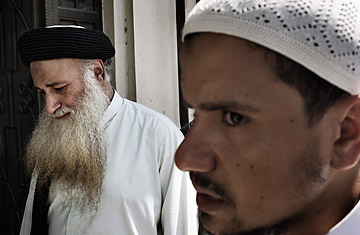
Mohamed Abdel Rahim al-Sharkawy spent 17 years behind bars in Egypt after being extradited from Pakistan in 1994. The fundamentalist Islamist was released from prison in March after numerous appeals from his family claiming his innocence.
(2 of 5)
So Sharkawy lingered in Saudi Arabia. He didn't have much money. He applied for a work visa and got rejected. But soon he learned that it was relatively easy to get a visa to Pakistan. "I got a visa for the jihad against the Soviets, so I had to go to Peshawar," he says. The Saudis were encouraging young men to go to support the holy war in Afghanistan. "They even gave us free tickets."
Sharkawy never went to Afghanistan. Instead, he found a community of Arabs in Peshawar — some of whom he knew from prison. "Some had gone for jihad and some had gone to escape the Egyptian government," he says. Ayman al-Zawahiri had done both. That's where they met and their friendship grew strong as Sharkawy found work in "Saudi NGOs," and eventually launched his own electronics business.
Soon, he had married a Pakistani woman and started a family. He sent for his Egyptian wife and two sons, who moved in with him in Peshawar. Everyone, including Sharkawy, became Pakistani citizens. And Pakistan became home — until 1993, when the rape of a girl in downtown Cairo changed everything, again.
"It was during Ramadan — in the middle of the day — in the street downtown," says Abdel Rahman, referring to a bus stop in Attaba Square in Cairo where a girl was reportedly gang raped. Despite numerous witnesses, Mubarak's justice system dragged its feet on the prosecution of the suspects. At one point, parliament — tasked with forging legislation to deal with the issue of how rape is handled — debated a law that would cast blame on the families of rape victims rather than on the rapists themselves. By the summer of 1994, "the Attaba case," as it became known, was dismissed for lack of evidence. Mubarak notoriously said that rape could happen to anyone, anywhere. In Pakistan, an English TV station interviewed Egyptians about it. Sharkawy was one of them. "He said that even in the United States, no one can touch a prostitute without her permission," says Abdel Rahman. "So he was condemning Mubarak's regime."
Almost immediately, Pakistan's Inter-Services Intelligence Directorate (ISI) arrested Sharkawy. It was July 1994. Within a year he had been "sold" to Egypt. He wouldn't see the outside world again until 2011. "They demolished my life," he says.
Prison is the kind of experience that hardens some people, breaks others, and leaves the rest feeling wiser. Sharkawy isn't angry. But he remembers the last 17 years of a life spent with Egyptian state security vividly. For the first five years, he was held in a small room so crowded with other prisoners that they had to take turns sleeping. Men around him died of tuberculosis, and the prisoners suspected that security officers would intentionally transfer TB-infected prisoners to cells containing an otherwise healthy crowd, just to spread the disease. Doctors rarely visited.
"After 2000, they kept me in solitary confinement," Sharkawy says. "They were punishing me because my father [wrote] complaints to the public prosecutor" demanding better treatment for him. By then, his family had filed at least five appeals. According to Sharkawy's son Abdel Rahman, the court had granted each one and ordered Sharkawy's release. But each time, he was turned over to the Interior Ministry, which overruled the court's decision using Egypt's Emergency Law — which also allows indefinite detention for individuals deemed potential threats — and sent him back to prison. "After several years I was asking, 'Why don't you let me go, I haven't done anything,'" Sharkawy says. "And they told me, 'Why should we let you go? You didn't cooperate. You haven't told us anything"
Sharkawy was ultimately one of 46 Egyptian prisoners listed on an official Opinion put out by the United Nation's Working Group on Arbitrary Detention in 2007. All 46 men had been held without charge for at least 13 years under the Emergency Law. Of the 46, the Opinion read: "Some of them are suspected members or supporters of banned Islamist groups but have never participated in violent acts, otherwise they would have been brought before military or exceptional courts and would have been charged and tried."
